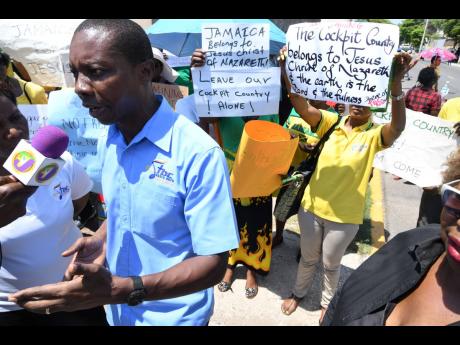Patricia Green | Heritage impact assessment for Cockpit Country
Baptist ministers James Phillippo and William Knibb mobilised the Moravians, Presbyterians, and others to establish free villages by acquiring lands to permit sale to the freed Africans. Some villages came about solely through the entrepreneurial efforts of the Africans themselves.
A chapel and schoolhouse built by free persons and manned by them, alongside missionaries, were integral to these village landscapes. Significantly, many new villages sprung up around the Cockpit Country. These villages survive today, among them Duncans, Clark’s Town, Alps, and Albert Town, to name a few.
On Friday, September 13, led by the Rev Jeffrey Shuttleworth of Tarrant Baptist Church and its TBC 88.5FM Radio, more than 1,000, including children, packed a tent at Ulster Spring in the Cockpit Country for a solemn assembly from 6 p.m. to 6 a.m. The reach extended globally through live coverage on radio and Facebook. The multidenominational assembly for prayer and supplication with the Cockpit Country communities and people of Jamaica was to petition God to liberate the environment from bauxite mining.
This assembly attracted Opposition Leader Peter Phillips and his team, who culminated their day of visiting mining activities around the Cockpit Country by joining under the tent for prayers. Supplication to God began by asking him for forgiveness for years of bloodshed on the land and to save the land from destruction through bauxite mining, in order to preserve the vital water supplies, flora, and fauna, and to preserve sustainable livelihoods.
Bauxite fault lines
The issues against bauxite mining in the Cockpit Country are multifaceted, yet simple and straightforward. They surround boundary delineation. First, there is a 2005 geology and geomorphological boundary that was developed by geologists at The University of the West Indies but excludes all else.
Second, the Cockpit Country Protected Area (CCPA), awaiting designation, covers most of the geology and extends slightly to include some flora and fauna.
Third is the Cockpit Country Stakeholder Group (CCSG) boundary that takes in the other two but adds, importantly, the towns and villages.
When the Government says that bauxite mining is occurring outside the Cockpit Country, the question continuously posed is: What is its definition of the Cockpit Country? The evidence shows that the areas defined by the Government appear to disregard the ways of life of the people. What of our important historical Maroon settlements and the 1738 Maroon Treaty cultural artefact, as well as a plethora of significant post-Emancipation free villages purchased by our freed African ancestors after Emancipation?
The Cockpit Country contains key ‘sites of memory’ of Taino, Spanish, British, African, Chinese, Indian, and Jamaican cultural contacts holding outstanding universal value. There is a call for an environmental impact assessment (EIA) survey, and this makes me so nervous because of the EIA’s narrow scope.
What is needed for the Cockpit Country is a heritage impact assessment, which integrates the natural and cultural heritage – the architecture, town-planning cultural landscapes, agricultural practices, people, etc.
I am a Cockpit Country descendant, the great-grandchild of Shadrack and Alice Bell, first-generation freeholder Baptist Christians, parents to Charlotte Elizabeth, mother of my dad. Our free village is Sherwood Content, Trelawny. Jamaican legend Usain Bolt and I share a common heritage and likewise do generations of Jamaicans of freehold legacy.
Free villages are the proud backbone of Jamaica, built on Christian foundations. Rev Shuttleworth has mobilised prayer stewardship to petition God’s intervention in the Cockpit Country. Rev James Phillippo wrote in 1843: “Many of the settlers had not a penny when they came, but they worked and paid for the land by its produce … and are eminently grateful both to Christians who worked for, and to God who gave them freedom.”
The Cockpit Country must and shall be liberated from all bauxite-mining activities.
Dr Patricia E. Green, an architect, is an academic programme manager at the University of Technology, Jamaica, and member of the International Council of Monuments and Sites International Scientific Committee on Cultural Landscapes. Email feedback to columns@gleanerjm.com and patgreen2008@gmail.com.


